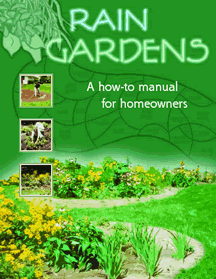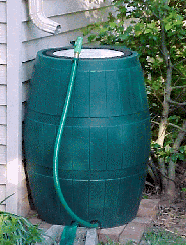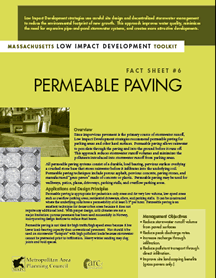- About Rain Barrels – a simple water conservation strategy.
- Rain Gardens
- About Permeable Paving
- Finally, checkout our brochure: 12 Easy Ways you can Stop Storm Drain Pollution
Rain barrels harvest and store water from your rooftop by collecting it from a gutter downspout. The stored water can be used for watering or other purposes that don’t require drinking water.
Rain barrels offer several advantages. Using rain for watering can reduce your water bill, be better for your plants than city water, and help rain percolate into the ground and recharge groundwater supplies. A well-made rain barrel is also mosquito-proof!
For information on grants to MA municipalities for rain barrel purchases, click here.
Instructions for Building Your Own Rain Barrel
More information, and pre-made rain barrels, are available from many vendors, including:

Comprehensive How-to Manual on installing rain gardens from the University of Wisconsin Extension Service.
Rain gardens are attractive landscaping features that double as water conservation strategies. The purpose of the garden (besides being beautiful) is to allow rain water to pool in a low spot just long enough to percolate into the ground. Again, you are recharging the local groundwater supply and saving on your water needs!
HooRWA, in collaboration with the Adams Community Development Department, has installed rain gardens at the BArt Charter School and at private residences in Adams. We are looking for small businesses who may also be interested in small rain garden installations.
Mass Riverways rain garden fact sheet.
Mass Riverways rain garden slide show.
List of Rain Garden plans for Vermont.
When rain and snow cannot soak into the ground, surface runoff increases, raising flood levels and polluting rivers. If even 10 to 25 percent of the landscape is impervious, it can have a measurable effect on water quality.
Rooftops, pavement, swimming pools, and patios are all impervious– barriers to percolation. Permeable paving is one way to reduce impervious surface on your property.
There are several kinds available. To find out whether it’s a good option for your home, business, or town, check the resource at right.
Need a simpler fix? Consider using turf or gravel in place of pavement, or use rain barrels and rain gardens to offset the impervious effect of your roof.
Fact Sheet on Permeable Paving »

